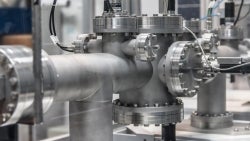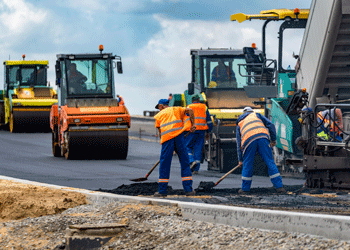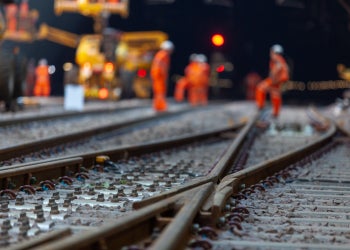Water sector braces for likely slowdown
27 December 2024

 Geopolitical tensions, climate change and higher-than-average population growth have exacerbated the water demand and supply gap across the Middle East and North Africa (Mena) region, home to some of the world’s most water-stressed countries.
Geopolitical tensions, climate change and higher-than-average population growth have exacerbated the water demand and supply gap across the Middle East and North Africa (Mena) region, home to some of the world’s most water-stressed countries.
For example, Jordan, where available water per capita is equivalent to only 12% of the absolute water scarcity level, hosts over 700,000 refugees fleeing wars and conflicts in neighbouring countries.
Most regional governments have developed and started to implement water strategies aimed at narrowing this gap. Subsidies are being phased out, environmental campaigns are being developed and digital solutions are being deployed in order to manage demand and improve efficiency.
Expanding desalination and treatment capacity, increasing treated sewage effluent (TSE) reuse, boosting reservoir capacity and building more efficient transmission and distribution networks are key levers used to improve supply.
Strong spending
These efforts have prompted significant capital spending on more energy-efficient water production, distribution and storage facilities, typically in partnership with private investors, particularly among the more affluent states.
According to data from regional projects tracker MEED Projects, the Mena region awarded $17bn of project contracts across the water desalination, treatment, transmission and distribution, storage and district cooling subsectors in the first nine months of 2024.
This figure represents about 72% of the contracts awarded in 2023 and is slightly above the average value of annual contract awards in the preceding five years.
 With only a few more packages expected to be awarded before the end of the year, 2024 looks set to be one of the best years so far in terms of water project activity, even if it fails to match the record value of contracts awarded in 2023, which reached almost $24bn.
With only a few more packages expected to be awarded before the end of the year, 2024 looks set to be one of the best years so far in terms of water project activity, even if it fails to match the record value of contracts awarded in 2023, which reached almost $24bn.
In 2024, Saudi gigaproject developer Neom set the pace in January by awarding a $4.7bn contract to build dams at the Trojena Mountain Resort in Tabuk to Italian contractor WeBuild.
The contract covers the construction of three dams that will form a freshwater lake for the Trojena ski resort. The main dam will have a height of 145 metres and will be 475 metres long at its crest. It will be built using 2.7 million cubic metres of roller compact concrete.
While this project does not necessarily belong to the band of solutions that aim to narrow the water supply and demand gap, the overall development is part of Saudi Arabia’s drive to boost tourism and diversify its economy away from oil.
Meanwhile, 2024 also saw the award by UAE northern emirate utility Sharjah Electricity, Water & Gas Authority of the contract to develop its first independent water project (IWP), the 400,000 cubic-metres-a-day facility in Hamriyah, to Saudi utility developer Acwa Power, the contract’s sole bidder.
In May, Saudi Arabia’s National Water Company announced that it had completed the award of 10 contracts under the first phase of its privatisation programme. Each rehabilitate, operate and transfer contract involves the retrofitting or expansion of existing sewage treatment plants and associated network, and their long-term operation and management. The facilities are expected to deliver water at the TSE level for irrigation reuse.
On the greenfield sewage treatment front, Saudi Water Partnership Company (SWPC) awarded a $400m contract to develop the Al-Haer independent sewage treatment plant (ISTP) project to a team comprising the local Miahona Company and Belgium’s Besix. The facility is the largest and first to be tendered under the third round of the water offtaker’s ISTP procurement programme.
In September, Chennai-headquartered VA Tech Wabag confirmed it had won a $317m contract to build the Ras Al-Khair seawater reverse osmosis (SWRO) facility in Saudi Arabia using an engineering, procurement and construction (EPC) model. The project client is Saudi Water Authority (SWA), formerly Saline Water Conversion Corporation.
In Oman, Nama Water Services awarded two water distribution network packages, worth a combined $600m, catering to Al-Dhahirah Governorate.
Jordan also appointed a team comprising Paris-based Meridiam, Suez and Vinci Construction Grands Projets, along with Egypt’s Orascom Construction, for the contract to develop the Aqaba-Amman water conveyance and desalination scheme. It is the country’s largest infrastructure project to date and the first phase is valued at an estimated $2bn-$3bn.
The project is crucial to addressing Jordan’s severe water shortage problem, piping desalinated water over 445 kilometres from the southern Red Sea coast to the country’s northern regions. The consortium is talking to lenders and aims to reach financial close for the project in 2025.
 Slower momentum
Slower momentum
Despite 2024 being a good year for contract awards, it fell short of the expectation built over the past few years, when the region’s largest economies began to execute their long-term water strategies.
For example, in Saudi Arabia, the years-long restructuring of the domestic water sector took a significant turn in 2024, with Water Transmission Company (WTCO), the kingdom’s licensed desalinated water transmission operator, gaining a broader portfolio of projects. As a result, the mandate to procure upcoming water transmission pipelines has been transferred to WTCO from SWPC.
The slower pace of IWP contract awards in Saudi Arabia was somewhat offset by a slew of tenders from SWA. The authority received bids for the EPC contracts to build four SWRO facilities in 2024, although as of November it had only managed to award one.
Earlier in 2024, Saudi gigaproject developer Neom also shelved a project to develop a zero-liquid discharge (ZLD) SWRO plant.
“The year may not have been as strong as 2023, but it is still a good year,” says Robert Bryniak, CEO of Dubai-based Golden Sands Management (Marketing) Consulting. “Some projects have been delayed or cancelled – for instance a few in Saudi Arabia – but all in all [2024 has been] a good year for the water business.”
Bryniak adds that Neom’s ZLD scheme is one of the year’s shelved projects that he would like to see revived in the future.
Beyond the GCC states, Morocco and Egypt are endeavouring to move their planned SWRO projects into the tendering phase.
In Morocco, Office National de L’Electricite et de L’Eue Potable (Onee) extended the review of its second IWP in Nador while waiting for its first IWP in Casablanca to reach financial close.
The first batch of renewable energy- powered desalination plants in Egypt has yet to reach the proposals stage despite the Sovereign Fund of Egypt having completed the bid prequalification process in 2023.

Potential contract awards
According to data from MEED Projects, an estimated $34bn-worth of water projects are in the tendering stage across the Mena region. A further $40bn-worth is in the prequalification stage and $57bn is in the design and study phases.
The $22bn Dubai Strategic Sewerage Tunnels (DSST) scheme stands out among the upcoming projects due to its scale, as well as for the chosen procurement approach.
The project aims to convert Dubai’s existing sewerage network from a pumped system to a gravity system by decommissioning the existing pump stations and providing a sustainable and reliable service that is fit for the future.
In April, Dubai Municipality launched the procurement process for the DSST project, which is to be developed as a public-private partnership (PPP).
While a dose of pessimism persists over the chosen PPP model – in part due to the project’s scale and strong civil works orientation, and Dubai’s dismal track record in procuring PPP schemes outside the utility sector – the project has managed to attract strong interest from EPC contractors, as well as from potential investors and sponsors.
Some of those that have sought to prequalify as investors, such as Begium’s Besix, Beijing-headquartered China Railway Construction Corporation and South Korea’s Samsung C&T, have previously been prequalified as EPC contractors for the DSST project, which suggests that the preferred approach of prequalifying EPCs ahead of investors could offer advantages.
In Saudi Arabia, WTCO, SWA, SWPC and Neom’s utility subsidiary Enowa are each expected to let several contracts in 2025, while Bahrain and Abu Dhabi could award one IWP contract each.
However, a robust overall pipeline does not necessarily guarantee that 2025 will resemble the upward trajectory that the sector has seen in the past two years.
“This year could be a turning point for the water industry throughout Mena,” says Bryniak, alluding to the possibility that, come January, the foreign and climate policies of the new occupant of the White House could affect the trend of water production capacity buildout in the Mena region.
Bryniak says that if US President-elect Donald Trump follows through with his promises, then we may be in store for, among other events, lower energy prices as the US drills more oil; a dampening of world trade as the US places tariffs on imports, especially on Chinese goods and services; less focus on the environment; and, generally, a more isolationist America.
“In my view, much depends on how much oil prices fall,” he continues.
“A significant drop in oil prices could result in cut-backs in a lot of development projects, and this, in turn, will adversely impact water demand and the overall build programme.”
However, the impact will not be uniform across asset types and procurement models, Bryniak notes. He expects water PPP projects to continue to grow, especially if capital availability is reduced by lower oil prices, as this is one way to preserve capital for use in other areas.
“I do not see any reason for tariffs to fall further in 2025. Tariffs, in my view, will remain roughly where they are now or increase slightly,” adds Bryniak.
However, the executive says that EPC contracts will likely have “a higher opportunity cost”, so there might be a reduced focus on this type of procurement model.
He concludes: “To the extent that development projects get trimmed down due to less capital being available as a result of significantly lower oil prices, then water procurers and other developers will likely scale back their projects.”
Exclusive from Meed
-
 Dewa raises Empower stake in $1.41bn deal
Dewa raises Empower stake in $1.41bn deal12 February 2026
-
 Saudi cabinet approves Qatar high-speed rail link
Saudi cabinet approves Qatar high-speed rail link12 February 2026
-
 Bidders line up for Saudi sewage treatment contract
Bidders line up for Saudi sewage treatment contract12 February 2026
-
 Indian firm wins Dubai Latifa Bint Hamdan road project
Indian firm wins Dubai Latifa Bint Hamdan road project12 February 2026
-
 SAR tenders Riyadh section of Saudi Landbridge
SAR tenders Riyadh section of Saudi Landbridge12 February 2026
All of this is only 1% of what MEED.com has to offer
Subscribe now and unlock all the 153,671 articles on MEED.com
- All the latest news, data, and market intelligence across MENA at your fingerprints
- First-hand updates and inside information on projects, clients and competitors that matter to you
- 20 years' archive of information, data, and news for you to access at your convenience
- Strategize to succeed and minimise risks with timely analysis of current and future market trends

Related Articles
-
 Dewa raises Empower stake in $1.41bn deal
Dewa raises Empower stake in $1.41bn deal12 February 2026
Dubai Electricity & Water Authority (Dewa) has announced it has increased its stake in Emirates Central Cooling Systems Corporation (Empower) from 56% to 80%.
The transaction was completed through the purchase of 2.4 billion shares and the transfer of the entire ownership of Emirates Power Investment (EPI), which is wholly owned by Dubai Holding.
The total value of the deal is AED5.184bn ($1.41bn).
Empower currently holds over 80% of Dubai’s district cooling market and operates 88 district cooling plants across the emirate.
According to MEED Projects, the UAE’s district cooling sector currently has nine projects worth $1.29bn in the pre-execution phase.
Empower has ownership in four of these projects, which have a combined value of $472m.
This includes a $200 million district cooling plant at Dubai Science Park, with a total capacity of 47,000 refrigeration tonnes serving 80 buildings.
Empower signed a contract to design the plant last August, with construction scheduled to begin by the end of the first quarter of 2026.
The utility is also building a district cooling plant at Dubai Internet City.
UAE-based TMF Euro Foundations was recently appointed as the enabling and piling subcontractor for the project.
https://image.digitalinsightresearch.in/uploads/NewsArticle/15635949/main.jpg -
 Saudi cabinet approves Qatar high-speed rail link
Saudi cabinet approves Qatar high-speed rail link12 February 2026
Saudi Arabia has approved the establishment of a proposed high-speed rail line connecting Riyadh and Doha.
The approval was granted during a cabinet session chaired by King Salman Bin Abdulaziz Al-Saud in Riyadh on 10 February.
The high-speed railway line will cover 785 kilometres (km) and will pass through Hofuf and Dammam, while also linking King Salman International airport and Hamad International airport.
Saudi Arabia and Qatar signed an agreement in December last year to build a high-speed rail line.
The agreement was inked by Saudi Arabia’s Transport & Logistics Services Minister, Saleh Al-Jasser, and Qatar’s Transport Minister, Sheikh Mohammed Bin Abdulla Bin Mohammed Al-Thani.
Trains will reach speeds exceeding 300 kilometres an hour, reducing the travel time between the two capitals to about two hours.
The project is slated for completion in six years. It is expected to serve over 10 million passengers annually and create more than 30,000 direct and indirect jobs.
Riyadh and Doha relaunched the proposed rail link between the two countries in 2022, after agreeing to set a date to begin studying the connection.
In July of that year, France’s Systra was selected to conduct a feasibility study on the proposed scheme, as MEED reported.
A rail link connecting Saudi Arabia and Qatar was planned before the diplomatic dispute that froze relations between Riyadh and Doha from 2017 until the Al-Ula Declaration was signed in January 2021.
In 2016, Qatar Railways Company (Qatar Rail) planned to tender a design-and-build contract for the construction of regional railways in Qatar, including a link to the Saudi border.
https://image.digitalinsightresearch.in/uploads/NewsArticle/15635582/main.jpg -
 Bidders line up for Saudi sewage treatment contract
Bidders line up for Saudi sewage treatment contract12 February 2026

Six bidders are competing in the next phase of Saudi Arabia’s long-term operations and maintenance (LTOM) sewage treatment programme, as National Water Company (NWC) moves closer to awarding a contract.
The contract covers the North Western A Cluster Sewage Treatment Plants Package 11 (LTOM11) and has an estimated value of about $211m.
The project involves the construction and upgrade of two sewage treatment plants with a combined capacity of about 440,000 cubic metres a day (cm/d).
As MEED understands, the companies that have submitted proposals include:
- Alkhorayef Water & Power Technologies (Saudi Arabia)
- Civil Works Company (Saudi Arabia)
- United Water (China)
- Kuzu Group (Turkey)
- VA Tech Wabag (India)
- Aguas de Valencia (Spain)
LTOM11, also known as the North Western A Cluster, forms part of the second phase of NWC’s rehabilitation of sewage treatment plants programme.
The scheme is being procured on an engineering, procurement and construction (EPC) basis with a long-term operations component.
The scope also includes a pumping station, surplus discharge lines, SCADA installation and associated infrastructure.
The main contract was tendered last year, with an award initially expected by the end of 2025.
It is now understood that NWC is preparing to offer the main contract in this quarter.
LTOM programme
LTOM11 follows a series of earlier awards under the programme.
In January, a consortium of United Water (China), Prosus Energy (UAE) and Armada Holding (Saudi Arabia) won the main contract for the Northern Cluster Sewage Treatment Plants Package 10 (LTOM10).
This has an estimated value of about SR203m ($54.1m).
NWC previously awarded $2.7bn-worth of contracts for the first phase of its LTOM programme. This comprises nine packages covering the treatment of 4.6 million cm/d of sewage water for the next 15 years.
As MEED reported, local contracting firm Alkhorayef Water & Power Technologies won three contracts with a combined capacity of 2.04 million cm/d, nearly half of the awarded total. These three contracts are worth more than SR5.53bn ($1.47bn).
A consortium of France’s Suez and the local Al-Awael Modern Contracting Group, with its affiliate Civil Works Company (CWC), won two packages worth a combined SR1.84bn.
A consortium comprising France’s Veolia and Awael-CWC won a single package worth SR1.26bn, and local utility developer Miahona won one package worth SR392m.
In 2024, a joint venture of CWC and Al-Awael Modern Contracting was awarded a $211m contract for LTOM9.
As part of the second phase, the main contract bids for LTOM12 (North Western B Cluster) have also been submitted.
https://image.digitalinsightresearch.in/uploads/NewsArticle/15635292/main.jpg -
 Indian firm wins Dubai Latifa Bint Hamdan road project
Indian firm wins Dubai Latifa Bint Hamdan road project12 February 2026
Indian contractor Larsen & Toubro (L&T) has won a contract to construct the first phase of the Latifa Bint Hamdan Street development project in Dubai.
The contract value is between $110m and $275m, according to L&T’s contract classification.
This project covers 12.2 kilometres of road network from its intersection with Al-Khail Road to Emirates Road.
The project also includes 8.1km of bridges and will add capacity for about 16,000 vehicles an hour in both directions.
The scope also involves widening the two-lane dual carriageway to four lanes in each direction.
The project is scheduled for completion within 36 months.
The contract was awarded by Dubai’s Roads & Transport Authority (RTA).
The project is part of the RTA’s estimated AED16bn ($4.3bn) 2024-27 Main Roads Development Plan, which includes 22 projects across Dubai’s road network, as announced in November 2024.
The development plan includes the construction of new roads and bridges to alleviate traffic congestion at several key locations across Dubai.
Planning for growth
The Dubai 2040 Urban Master Plan was launched in March 2021. Its launch referenced studies indicating that the emirate’s population will reach 5.8 million by 2040, up from 3.3 million in 2020. The daytime population is set to increase from 4.5 million in 2020 to 7.8 million in 2040.
In December 2022, Sheikh Mohammed Bin Rashid Al-Maktoum, Vice President and Prime Minister of the UAE and Ruler of Dubai, approved the 20-Minute City Policy as part of the second phase of the Dubai 2040 Urban Master Plan.
In addition to the road projects, the RTA’s Dubai Metro Blue Line extension also forms part of Dubai’s plans to improve residents’ quality of life by cutting journey times, as outlined in the policy.
The policy aims to ensure that residents can meet 80% of their daily needs within a 20-minute walk or bike ride. This goal will be achieved by developing integrated service centres with the necessary facilities and by increasing population density around mass transit stations.
https://image.digitalinsightresearch.in/uploads/NewsArticle/15635237/main.gif -
 SAR tenders Riyadh section of Saudi Landbridge
SAR tenders Riyadh section of Saudi Landbridge12 February 2026

Saudi Arabia Railways (SAR) has tendered a design-and-build contract for the construction of a new railway line, the Riyadh Rail Link, which will run from north to south Riyadh.
The tender was issued on 29 January, with a bid submission deadline of 29 March.
The scope of work includes constructing a 35-kilometre-long double-track railway line connecting SAR’s North-South Railway to the Eastern Railway network.
The contract also covers the procurement, construction and installation of associated infrastructure such as viaducts, civil works, utility installations, signalling systems and other related works.
The project is expected to form a key component of the Saudi Landbridge railway.
Last month, SAR said it would deliver the Saudi Landbridge project through a “new mechanism” by 2034, after failing to reach an agreement with a Chinese consortium for the construction of the project, as MEED reported.
In an interview with local media, SAR CEO Bashar Bin Khalid Al-Malik said the consortium failed to meet local content requirements and that the project will now be delivered in several phases under a different procurement model.
The project has been under negotiation between Saudi Arabia and China-backed investors keen to develop it through a public-private partnership.
Al-Malik said that the project cost is about SR100bn ($26.6bn).
It comprises more than 1,500 kilometres (km) of new track. The core component is a 900km new railway between Riyadh and Jeddah, which will provide direct freight access to the capital from King Abdullah Port on the Red Sea.
Other key sections include upgrading the existing Riyadh-Dammam line, a bypass around the capital called the Riyadh Link, and a link between King Abdullah Port and Yanbu.
The Saudi Landbridge is one of the kingdom’s most anticipated project programmes. Plans to develop it were first announced in 2004, but put on hold in 2010 before being revived a year later. Key stumbling blocks were rights-of-way issues, route alignment and its high cost.
In April last year, MEED exclusively reported that SAR had issued a tender for the lead design consultancy services contract on the Saudi Landbridge railway network.
MEED understands that the scope covered the concept design and options for the preliminary and issued-for-construction design stages on the network.
MEED reported that the launch of a design tender directly by SAR suggested that Riyadh was looking at other options to develop it alongside the Chinese proposal.
In December 2023, MEED reported that a team of US-based Hill International, Italy’s Italferr and Spain’s Sener had been awarded the contract to provide project management services for the programme.
If it proceeds, the Saudi Landbridge will be one of the largest railway projects ever undertaken in the Middle East and one of the biggest globally. Based on typical design timeframes, tenders for construction are likely to be ready by mid-2026, although the question of how it will be financed will need to be answered before it can proceed to the next step.
https://image.digitalinsightresearch.in/uploads/NewsArticle/15635220/main.jpg



.gif)